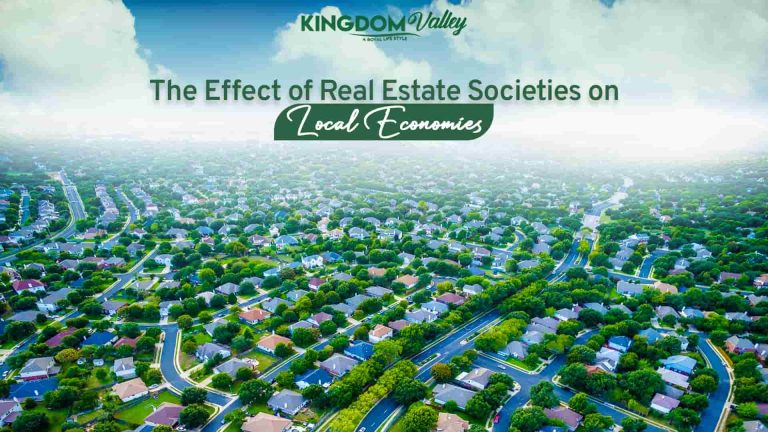The Effect of Real Estate Societies on Local Economies

Examining the Effects of Real Estate Societies on Local Economic Growth, Employment, and Industry Development
Real estate has always played a significant role in shaping economies and communities around the world. Effect of Real Estate societies, often referred to as housing societies or residential developments, are planned communities that encompass residential, commercial, and recreational areas. These societies have the potential to exert a substantial impact on local economies by creating jobs, driving industry growth, and contributing to overall economic development. This article delves into the ways in which real estate societies influence local economies, with a specific focus on the crucial role played by Kingdom Valley Islamabad housing society in Pakistan.
Introduction to Real Estate Societies and Their Economic Influence
Real estate societies are comprehensive residential developments that offer a wide range of amenities and facilities to their residents. These societies are carefully planned to include not only housing units but also commercial spaces, parks, schools, healthcare facilities, and other essential infrastructure. The concept behind these societies is to create self-contained communities where residents can live, work, and socialize without needing to travel long distances.
One of the most significant ways in which real estate societies impact local economies is through job creation. The construction phase alone generates a plethora of job opportunities for architects, engineers, laborers, electricians, plumbers, and other professionals involved in the building process. Beyond the construction phase, operational jobs are created to manage and maintain the society’s facilities, ensuring that everything runs smoothly for the residents.
Also Read: The Most Desired Residential and Commercial Project in Islamabad.
Job Creation and Economic Growth
Real estate societies can lead to a substantial boost in local economies through the creation of jobs across various sectors. The development phase requires a diverse range of skills, from urban planning and design to construction and landscaping. These jobs provide employment opportunities for both skilled and unskilled labor, benefiting the local workforce.
Additionally, the presence of commercial spaces within these societies contributes to job creation in retail, hospitality, and other service-oriented industries. Small businesses such as convenience stores, restaurants, cafes, and salons often find a thriving customer base within these self-contained communities. This not only caters to the needs of the residents but also supports local entrepreneurship and business growth.
Industry Growth and Infrastructure Development
Real estate societies also catalyze industry growth by attracting investments and promoting infrastructure development. As these societies become more attractive to potential homebuyers and investors, there is an increased demand for associated industries such as real estate agencies, property management firms, and financial institutions providing mortgages and loans. This heightened economic activity can lead to the establishment of complementary industries, further boosting the local economy.
Furthermore, the development of modern infrastructure within these societies can have a ripple effect on the surrounding areas. Improved road networks, better public transportation options, and upgraded utilities can extend beyond society’s boundaries, benefiting neighboring communities as well. The infusion of capital for infrastructure projects can lead to a better quality of life for residents and enhanced connectivity for the region.
Kingdom Valley Islamabad: A Case Study
One noteworthy example of the impact of a real estate society on a local economy is the Kingdom Valley Islamabad housing society in Pakistan. Located on the outskirts of the capital city, this society has emerged as a prime example of how planned residential developments can transform local economies.
Job Creation:
The construction of Kingdom Valley Islamabad has generated a significant number of jobs for skilled and unskilled laborers. From architects and engineers designing the infrastructure to laborers implementing the construction, the project has contributed to both specialized and manual employment opportunities.
Boosting Local Businesses:
The commercial spaces within Kingdom Valley Islamabad Location have attracted various businesses, including retail stores, restaurants, and service providers. This influx of businesses has not only catered to the needs of the residents but has also created jobs and boosted local commerce.
Real Estate Industry Growth:
The success of Kingdom Valley Islamabad has led to increased interest in the surrounding real estate market. This has spurred the growth of real estate agencies, property valuation services, and legal firms specializing in property transactions. The expansion of the real estate industry has, in turn, contributed to economic growth in the region.
Infrastructure Development:
The establishment of Kingdom Valley Islamabad has prompted improvements in the local infrastructure. Road networks have been upgraded, and utility services have been extended to cater to the needs of the society’s residents. These improvements have positively impacted the overall quality of life for both society residents and nearby communities.
Conclusion
Real estate societies are more than just residential complexes; they are powerful engines of economic growth. Through job creation, industry growth, and infrastructure development, these societies can significantly impact local economies and contribute to the overall development of the region. The case study of Kingdom Valley Islamabad demonstrates how a well-planned housing society can bring about positive changes to a local economy, providing insights into the potential benefits of similar developments in other parts of the world. As urbanization continues to shape our societies, the role of real estate societies in economic progress remains a topic of great importance.
